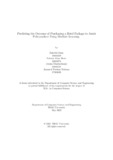Predicting the outcome of purchasing a hotel package to assist policymakers using machine learning
Abstract
Given the growing and massive shock to the hotel industry, the coronavirus (COVID-
19) outbreak has generated an unexpected problem. The hotel industry is currently
facing a big obstacle during the COVID period, where strategies designed to promote
sustainability will play an essential role for the industry. Hotel policymakers
would need to learn from the COVID-19 issue in order to increase sales, improve
crisis management policies, and better prepare targets and the industry as a whole
to respond to unforeseen situations. It would be preferable if the hotel sector used
information and technology and focused on automated ways of learning and forecasting
from historical data. The objective of this research is to study customer
information in order to make a recommendation to the policy maker and marketing
team, as well as to develop a model to predict who will buy the newly launched vacation
package. It will assist the hotel industry in enabling and establishing a viable
business model for growing their customer base. As a result, we’re adopting machine
learning to predict which customers will be interested in purchasing the hotel
package. A survey was used to gather data for this study. The data was evaluated
to uncover key elements for our study, and we employed seven algorithms, namely,
Random Forest Classifier, K Neighbors Classifier, Naive Bayes, AdaBoost, Support
Vector Machine, Logistic Regression, and Gradient Boosting algorithm, to predict
potential customers based on those features. We have obtained an accuracy of 95%
while also reducing the number of false negatives by using the Gradient Boosting
Classifier, Support Vector Machine, Random Forest Classifier, Naive Bayes, Logistic
Regression. Our findings show that, without a team of analysts, our analysis
and suggested approach can provide the finest insight to policymakers to help them
make better decisions.

